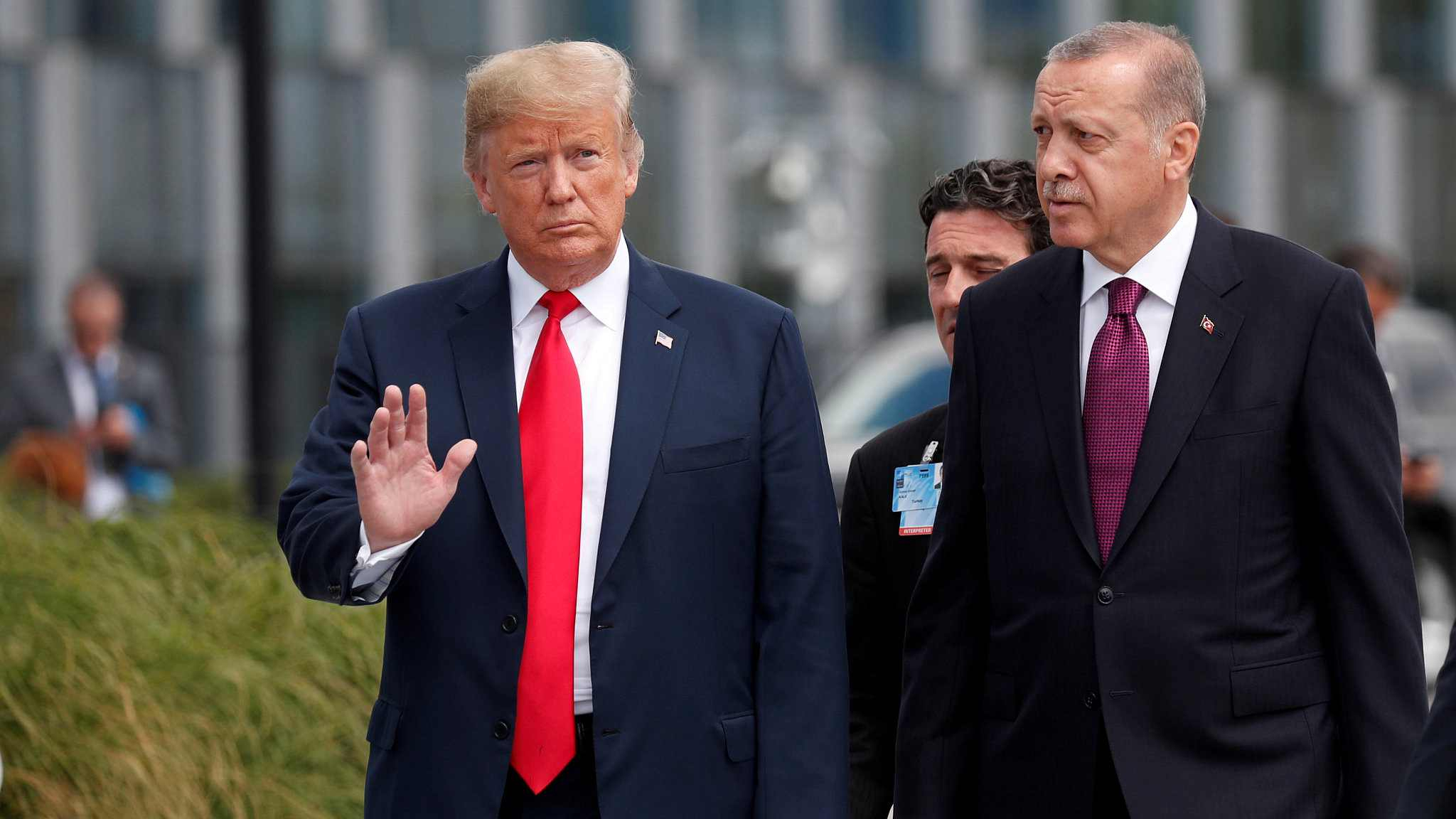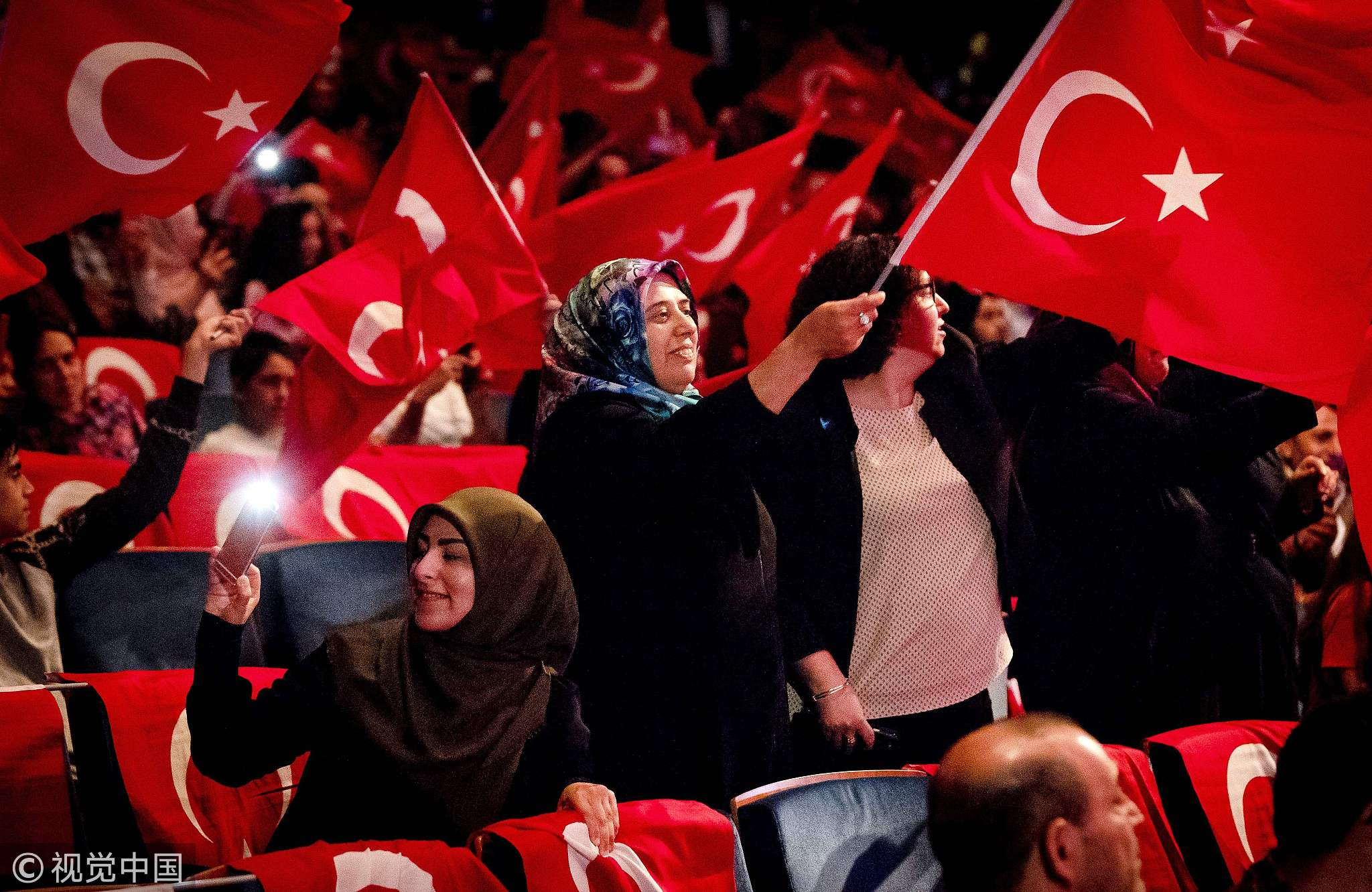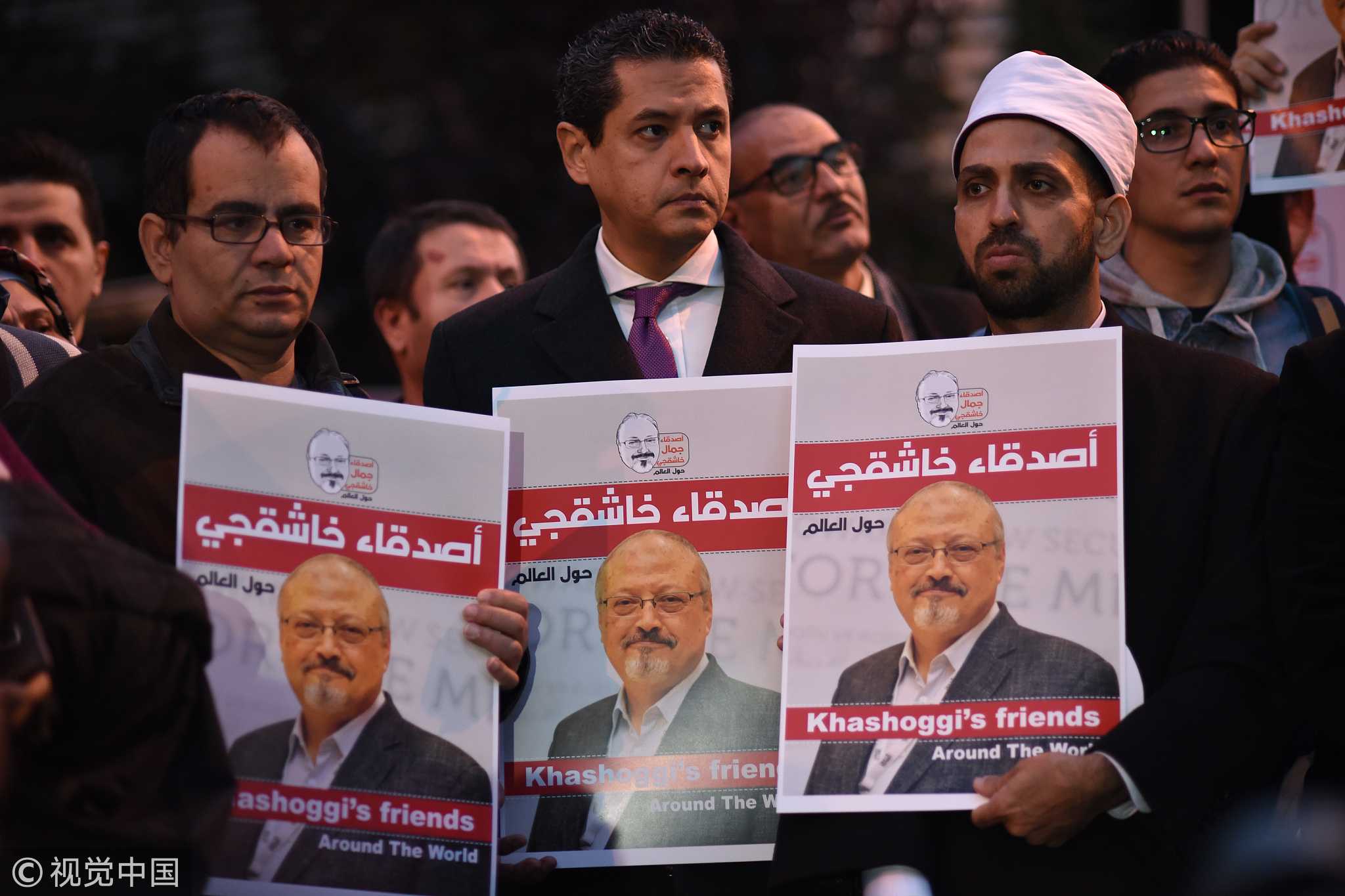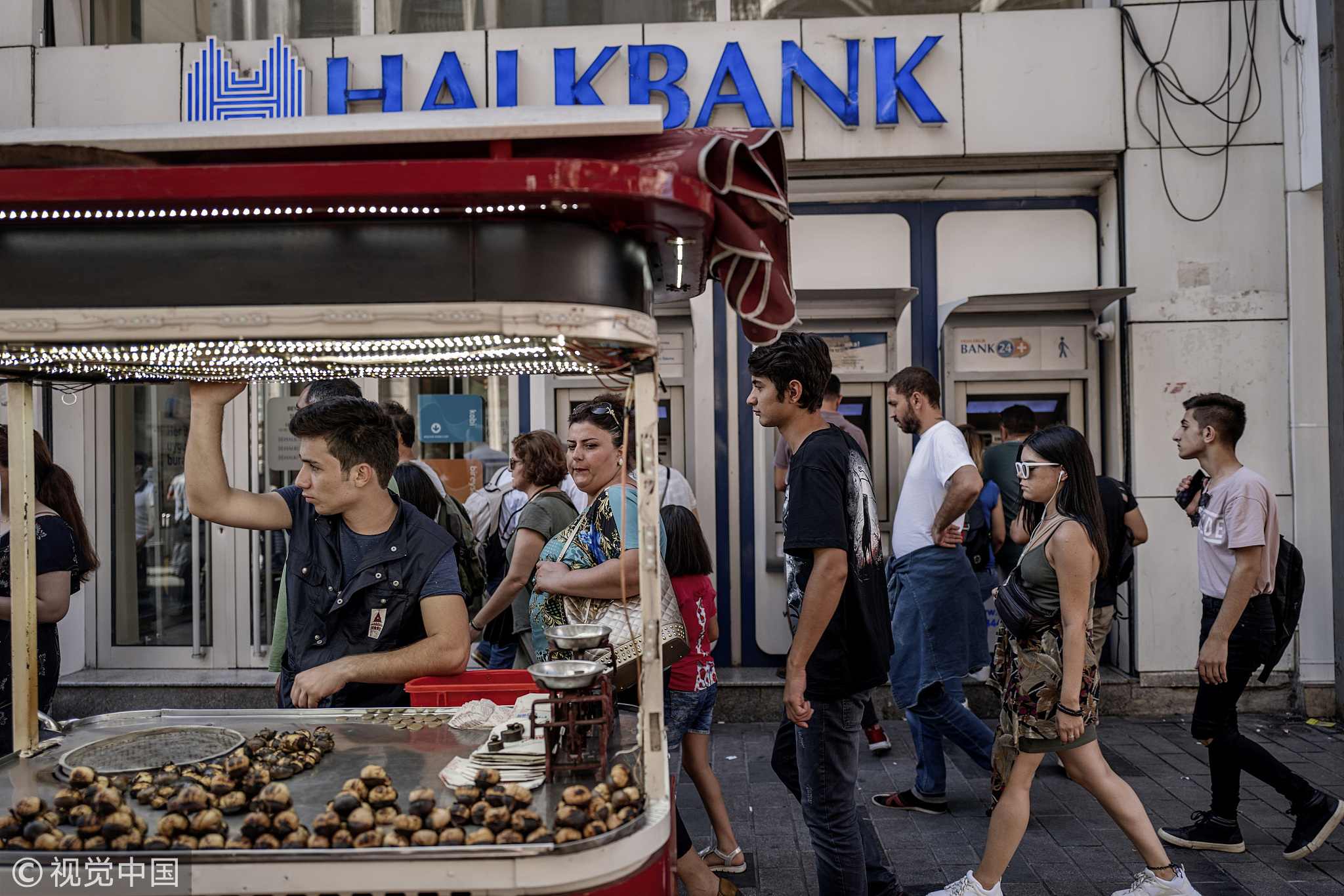
Opinions
21:05, 11-Nov-2018
Opinion: The 'uneasy' rapprochement between the US and Turkey
Updated
20:40, 14-Nov-2018
Wang Jin

Editor's note: Wang Jin is a research fellow at the Charhar Institute and a research fellow of the Northwest University of China. The article reflects the author's opinion, and not necessarily the views of CGTN.
Turkish President Recep Tayyip Erdogan and US President Donald Trump chatted for a while on November 10 during a dinner in Paris. Erdogan and Trump arrived in Paris at the invitation of French President Emmanuel Macron to attend Armistice Day commemorations. The meeting between Erdogan and Trump was the first major meeting between the two leaders in the past three months since the Turkey-US relation was deteriorated by Ankara's arrest of US pastor Andrew Brunson and Washington's economic sanctions against Turkey.
As politicians whose manners and approach to international affairs are controversial to many international observers, Erdogan and Trump have readjusted to each other during the past months. Different sensitive issues, including the arrest of Brunson, attitudes towards the Syrian Kurds led by Kurdish Democratic Union Party (PYD), the extradition of the leader of the Gulen Movement, Fethullah Gulen, from the US back to Turkey, were properly handled and bilateral ties between Turkey and the US seem to be getting back on track.
For the US, Turkey is always a “problematic alliance,” even though both states are NATO members. Turkey's political system, according to the US, has always been a problematic one. Turkey's political history is interrupted by several military coups, and when there were no military coups, Turkey's political structure had their own challenges with respect to the quality of human rights, especially the status of Kurdish groups in southern Turkey.
After the Justice and Development Party (AKP) led by Erdogan assumed power in 2002, many US observers believe that Turkey is becoming increasing “Islamized” and the traditional “democratic values” has been largely threatened.
A similar perception of the US also exists in Turkey. According to the Pew Research Center, only 18 percent of Turks have a favorable perception of the US, while more than 70 percent of Turks perceive the US as a major threat to Turkey. US military involvement in Afghanistan and Iraq worsened the image of US in Turkey, many Turks believe that the US was invading the Islamic world. After the failed military coup attempt in 2016, Erdogan and his AKP government believed the US was behind the coup and Washington's rejection of extradition of Fethullah Gulen strengthened Turkey's distrust in the US.

People wave Turkish flags during a ceremony marking the anniversary of last year's failed coup attempt in Turkey, at the Orpheus Theater in Apeldoorn, on July 11, 2017. /VCG Photo
People wave Turkish flags during a ceremony marking the anniversary of last year's failed coup attempt in Turkey, at the Orpheus Theater in Apeldoorn, on July 11, 2017. /VCG Photo
The most recent breaking point between the US and Turkey emerged when Turkey arrested the pastor Andrew Brunson last summer. Several rounds of negotiations were organized between Ankara and Washington to facilitate Turkey's release of Brunson. In order to encourage Turkey's release of Brunson, Trump even persuaded Israel to release Ebru Ozkan, who was arrested at Ben Gurion airport in Tel Aviv and was facing terrorism charges.
However, after Turkey rejected the idea of releasing Brunson in September, the US felt betrayed and decided to take harsh measures to punish Turkey. In late September, the US approved the Global Magnitsky sanctions against the Turkish justice and interior ministers and doubled the tariffs on Turkish steel and aluminum.
US punishments caused economic hardship and currency devaluation in Turkey and finally persuaded Turkey to release Brunson in October. The horrendous murder of Saudi journalist Jamal Khashoggi in the Saudi consulate in Istanbul accelerated the speed of the restarting of high-level contacts between Ankara and Washington. Trump and Erdogan, who had not spoken with each other for more than 100 days, had two phone calls in the last few weeks.

People hold pictures of Jamal Khashoggi during the demonstration in front of Saudi Arabian consulate in Istanbul, Turkey, October 25, 2018. /VCG Photo
People hold pictures of Jamal Khashoggi during the demonstration in front of Saudi Arabian consulate in Istanbul, Turkey, October 25, 2018. /VCG Photo
The economic sanctions from Washington against Turkey were lifted in this month, the joint US-Turkey patrol forces in northern Syria was established, and Trump added Turkey to the “exemption list” from the newly introduced sanctions on the imports of Iranian crude oil last week.
Although the positive developments between Ankara and Washington continues, there are still challenges. Disagreements between Ankara and Washington over the PYD will continue to influence bilateral ties. Although the Deputy Assistant Undersecretary Matt Palmer announced bounties on the heads of the three top Kurdistan Workers' Party (PKK) leaders in his trip to Ankara days ago, Turkey still wants more. Turkey hopes the US would label the PYD in Syria as the “terrorist group” and suspend cooperation with the PYD in northern Syria.
Meanwhile, the most imminent challenge comes from the ongoing US investigation over the Turkish Halkbank, a major bank in Turkey. The US Department of Treasury and the US Court of Southern District of New York are both investigating if Halkbank is guilty of helping Iran violate US sanctions, and it is very likely that Halkbank will have to face fines from the US. Given the close relationship between Erdogan and the Halkbank, the punishments against Halkbank from Washington might threaten bilateral ties between the two countries.

A nut seller waits for customers outside a Turkiye Halk Bankasi AS bank branch, also known as Halkbank, in Istanbul, Turkey, on Monday, August 13, 2018. /VCG Photo
A nut seller waits for customers outside a Turkiye Halk Bankasi AS bank branch, also known as Halkbank, in Istanbul, Turkey, on Monday, August 13, 2018. /VCG Photo
In addition, Washington hopes Turkey will suspend its purchase of the Russian S-400 air defense system. With Russia's expanding footprint, the fragile security situation in Iraq and Syria, and the growing missile capabilities of regional states, Turkey needs to strengthen its air defense capabilities by introducing this Russian air defense system. However, according to the US, the introduction of S-400 into Turkey, a NATO member, might threaten the unity of NATO and also leak secret information to Russia.
Turkey and the US need each other, and we are witnessing the continuation of the improving bilateral ties between the two states after months of difficulties. Although there are still challenges ahead, neither side can afford to lose each other. There are many, both inside Turkey and US, who firmly believe that the bilateral alliance should be preserved and the challenges could be overcome.
(Cover Photo: US President Donald Trump and Turkish President Tayyip Erdogan attend the start of the NATO summit in Brussels, Belgium, July 11, 2018. )
(If you want to contribute and have specific expertise, please contact us at opinions@cgtn.com)

SITEMAP
Copyright © 2018 CGTN. Beijing ICP prepared NO.16065310-3
Copyright © 2018 CGTN. Beijing ICP prepared NO.16065310-3